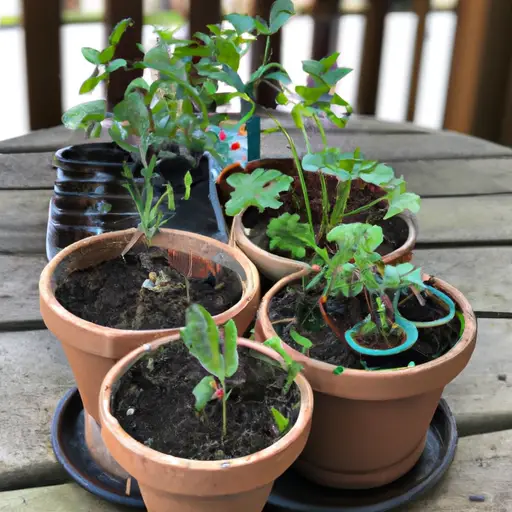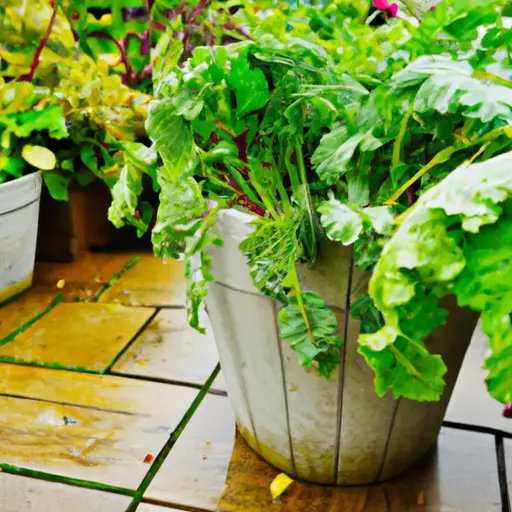Sustainable Living Made Easy Through Organic Container Gardens
In recent years, the concept of sustainable living has gained significant attention and importance. With increasing concerns about the environment and food production methods, many individuals are looking for ways to reduce their ecological footprint while still enjoying fresh, organic produce. One solution that has gained popularity is organic container gardening.
Organic container gardening offers numerous benefits, making it an ideal option for those seeking a sustainable lifestyle. It allows individuals to grow their own food, even in limited spaces such as balconies, patios, or small urban yards. The practice of container gardening not only provides easy access to fresh vegetables and herbs but also promotes greener living by reducing transportation emissions associated with store-bought produce.
Container gardens typically involve growing plants in pots or other containers instead of directly in the ground. This method offers several advantages over traditional gardening methods. Firstly, it provides more control over the soil quality and nutrients available to the plants. By using high-quality organic soil mixtures enriched with compost or other organic matter, gardeners can ensure that their plants receive optimal nutrition without relying on chemical fertilizers.
Furthermore, container gardens facilitate better pest control as they can be easily moved and protected from harmful insects or diseases. This reduces the need for harmful pesticides and promotes a healthier ecosystem in and around the garden. Additionally, container gardens tend to have fewer weed problems due to their controlled environment, minimizing the need for herbicides.
One significant advantage of organic container gardening is its ability to conserve water efficiently. Unlike traditional gardens that require extensive watering due to surface evaporation or excess runoff, container gardens retain moisture better since the water directly reaches plant roots without being wasted on surrounding soil areas. By using self-watering containers or incorporating simple irrigation systems like drip hoses or olla pots, container gardeners can significantly reduce water consumption while keeping their plants adequately hydrated.
Another advantage of organic container gardening is its suitability for year-round cultivation. Containers can be easily moved indoors during extreme weather conditions, allowing for continuous gardening regardless of the season. This flexibility enables individuals to grow their favorite herbs and vegetables all year, ensuring a steady supply of fresh produce and reducing the need for purchasing out-of-season and often imported goods.

Creating an organic container garden is relatively straightforward, even for beginners. The first step is to choose suitable containers that provide adequate drainage while accommodating the desired plant’s root system. Materials like terracotta, wood, or food-grade plastic are popular choices due to their durability and breathability.
Once containers are selected, it is crucial to choose appropriate plants according to their space requirements, sunlight needs, and compatibility with other nearby plants. Popular choices for container gardens include tomatoes, peppers, lettuce, spinach, herbs like basil or mint, and even dwarf fruit trees like citrus or figs. Many seed catalogs offer specific “patio” or “container” varieties tailored to small-space gardening.
The next step is selecting organic soils enriched with compost or other organic amendments. Organic potting mixes that contain a blend of peat moss, coconut coir fibers, vermiculite or perlite provide excellent water retention and proper aeration for plant roots.
Regular watering is essential to ensure the health and productivity of container gardens. While different plants have varying water requirements, a general rule is to keep the soil moist but not soaked. Overwatering can lead to root rot or fungal diseases. To achieve efficient water usage in containers, techniques such as mulching with straw or wood chips can help retain moisture while minimizing evaporation.
To maintain soil fertility over time in organic container gardens, regular feeding with organic fertilizers or compost tea becomes necessary. These natural amendments provide essential nutrients needed for healthy plant growth without relying on synthetic chemicals that may harm beneficial soil organisms.
Organic container gardening also presents an opportunity for composting kitchen scraps as a sustainable waste management solution. Composting not only reduces waste sent to landfills but also produces nutrient-rich compost that can be used to enrich container soils. Composting bins or worm composting systems can be easily incorporated into the garden or placed nearby for convenient access.
In conclusion, sustainable living can be made easy through organic container gardening. This practice promotes self-sufficiency, reduces carbon emissions from food miles, conserves water, minimizes pesticide use, and offers an opportunity for year-round cultivation. With a little creativity and effort, anyone can enjoy the benefits of growing their own fresh, organic food in a small space. By adopting this eco-friendly practice, individuals contribute to a healthier planet while enjoying the rewards of sustainable living.














How can i have a sustainable Living Made Easy Through Organic Container Gardens?
How can I have a sustainable Living Made Easy Through Organic Container Gardens?
Having a sustainable living through organic container gardens can be made easy by following these steps:
1. Choose the right containers: Select containers made from sustainable materials, such as terracotta, wood, or recycled plastic. Make sure they have drainage holes to prevent waterlogging.
2. Use organic soil and compost: Fill your containers with certified organic potting soil enriched with compost. This ensures that your plants receive essential nutrients without any harmful chemicals or synthetic fertilizers.
3. Select organic seeds or seedlings: Look for organic seeds or seedlings from reputable sources to ensure they are free from genetically modified organisms (GMOs) and synthetic pesticides.
4. Water wisely: Use a watering can or drip irrigation system to provide water directly to the plant roots, minimizing wastage. Collect rainwater in barrels for an eco-friendly water source.
5. Companion planting: Utilize companion planting techniques, where certain plants help each other grow and repel pests naturally. For example, marigolds deter aphids, while basil improves the flavor of tomatoes and repels pests.
6. Natural pest control: Introduce beneficial insects like ladybugs and lacewings that feed on harmful pests like aphids and caterpillars. Create habitat for birds and frogs which can further reduce pest populations in your garden.
7. Organic fertilizers: Use natural fertilizers like compost tea or seaweed extracts to nourish your plants organically. Avoid chemical fertilizers as they can harm beneficial microbes in the soil and contaminate groundwater.
8. Mulching: Apply organic mulch such as straw or wood chips around your plants’ base to suppress weeds, retain moisture, and improve soil health naturally.
9. Rotate crops: Practice crop rotation by changing the location of your container plants each growing season. This helps prevent soil depletion, control pests naturally, and maintain a healthy garden ecosystem.
10. Harvest and store sustainably: Harvest your produce when ripe, and store them in reusable containers or eco-friendly alternatives like beeswax wraps instead of single-use plastic.
By following these practices, you can create a sustainable and organic container garden that promotes environmental health and supports your living needs.